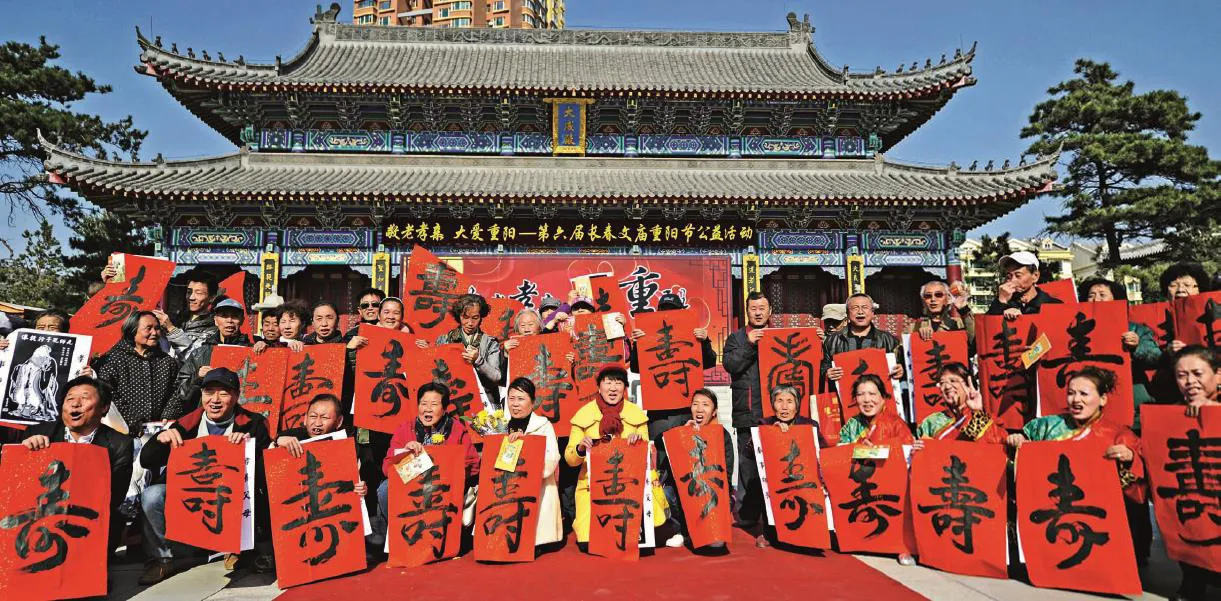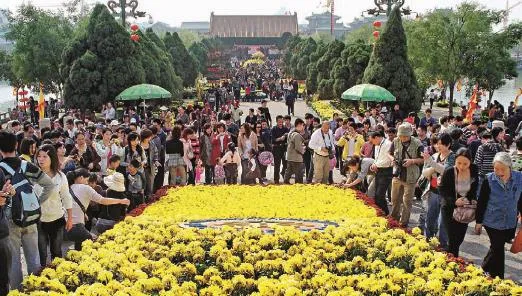Double Ninth Festival: Respect for Elders and Prayers for Blessings
Double Ninth Festival: Respect for Elders and Prayers for Blessings

Calligraphers display the Chinese character for “longevity” at a celebration of the Double Ninth Festival in Changchun,Jilin Province on October 21, 2015.
THE Double Ninth Festival falls on the ninth day of the ninth lunar month. Chinese ancients believed that nine was the largest number. According to the yin/yang dichotomy that forms the basis of the Chinese view of the world, yin represents the elements of darkness and yang represents life and brightness. The number nine is regarded as yang. In addition, the Chinese word for “nine” is a homophone for “long,” so “double ninth” implies a long and healthy life. Aptly the festival is traditionally a holiday for the elderly.
Activities to celebrate the Double Ninth Festival are colorful, including sightseeing tours, climbing mountains, enjoying chrysanthemum flowers, drinking chrysanthemum wine, carrying dogwood, and eating Double Ninth Cake. Since autumn is a golden season for harvesting, people have always had a special feeling for this festival, which was listed into China’s national intangible cultural heritage in 2006.
Ascending Height
The time-honored festival came into being back in the Spring and Autumn (770-476 BC) and Warring States (475-221 BC) periods. It became more popular and was praised by men of literature and writing during the Wei and Jin dynasties (220-420). It has been officially set as a festival since the Tang Dynasty(618-907).
According to historical data, its origins relate to agricultural production. The ninth month in the lunar calendar (October in the Gregorian calendar) is the time of a fruitful harvest. To celebrate the hardwork and give thanks for Heaven’s blessing, ancient people worshiped heaven at that time. The ninth month in the lunar calendar is also the reversal of seasons, and winter is just around the corner. People feel the climatic variations, and have hence formed the custom of ascending to great heights to avoid epidemic diseases.
If the Qingming (tomb-sweeping) Festival is associated with spring outings, then the Double Ninth Festival is the equivalent for autumn.
There is also a folklore about the origin of the festival. During the Eastern Han Dynasty (25-220),there lived a plague demon in the Ruhe River area,in today’s Zhumandian City, Henan Province. People died of pestilence upon beholding it.
A young man named Heng Jing, whose parents died of the plague, decided to visit the immortals and learn how to kill the demon. Having undergone dangers and hardships, Heng at last found an immortal with boundless supernatural powers, living in a remote mountain, to be his master. Moved by his courage and resolve, the immortal taught him swordsmanship and gave him a magic sword.
One day, the immortal told Heng that the devil would appear again on the ninth day of the ninth lunar month, and that he should go back to kill it. With a packet of dogwood, a bottle of chrysanthemum wine, and his newly-learned skills, he went home.
Activities to ceiebrate the Doubie Ninth Festivai inciude sightseeing tours,ciimbing mountains,enjoying chrysanthemum fiowers, drinking chrysanthemum wine,carrying dogwood, and eating Doubie Ninth Cake.
On that morning, Heng climbed to the top of a mountain with all the people in the village. Each carried a piece of dogwood and a cup of chrysanthemum wine. When the devil appeared at noon, he paused and trembled at the smell of the dogwood and wine. At that moment, Heng rushed down from the top of the mountain and slayed the devil effortlessly. Since then, people have formed the habit of climbing mountains during the Double Ninth Festival in the hope of avoiding illness and disaster.

Climbing mountains and enjoying flowers are festival traditions.
Cultural Features
After 2,000 years of evolution, the festival embraced the theme of fitness and safeness, blessing and longevity, as well as pursuing good fortune and avoiding disaster. Its abundant cultural connotations have become an important component of Chinese culture.
First and foremost is the tradition of respecting elders. The aged are not only the elders of a family,but also the forefathers of society, representing the wisdom of the entire nation and a source of cultural creation and inheritance. Filial piety in Chinese culture means respecting ancestors and serving one’s parents, which is the most basic ethical way to conduct oneself.
Moreover, the rich activities at the festival were sources of inspiration for numerous artists in different epochs who have left behind many timeless works.
There are many poems written about this festival. The most popular one is “Thinking of My Brothers in Shandong on the Double Ninth Festival” by Wang Wei (701-761):
All alone in a foreign land
I am twice as homesick on this day. When brothers carry dogwood up the mountain Each of them a branch - and my branch missing.
( Compiled by China Today )

